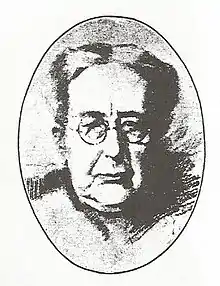Harriet Reynolds Krauth Spaeth | |
|---|---|
 | |
| Born | Harriet Reynolds Krauth September 21, 1845 Baltimore, Maryland |
| Died | May 5, 1925 (aged 79) Philadelphia, Pennsylvania |
| Other names | Harriet R. K. Spaeth, Harriett Spaeth |
| Occupation | Hymn writer |
| Children | 3, including Sigmund Spaeth |
| Parent | Charles Porterfield Krauth |
| Relatives | Charles Philip Krauth (grandfather) John Duncan Spaeth (stepson) |
Harriet Reynolds Krauth Spaeth (September 21, 1845 – May 5, 1925)[1] was an American organist, translator, and hymn writer.
Early life
Harriet Reynolds Krauth was born in Baltimore, the daughter of Charles Porterfield Krauth and Susan Reynolds Krauth. Her mother died when Harriet was young.[2][3] Her father was a theologian, a prolific hymn translator, and vice-provost at the University of Pennsylvania.[4] Her grandfather Charles Philip Krauth was president of Gettysburg College.[5][6] She attended the Philadelphia High School for Girls.[7]
Career
Spaeth was the longtime organist at St. Stephen's Lutheran Church in Philadelphia.[7] She was the music editor of Lutheran Church Book with Music (1872),[3][8] and wrote articles for church publications. She wrote or translated the lyrics to more than two dozen hymns. She is best known as the writer of English lyrics to "Lo, How a Rose E'er Blooming".[9][10] Other hymns written or translated by Spaeth include "As Each Happy Christmas Dawns on Earth Again", "Behold a Branch is Growing", "Church Bells Ring, Sweet Birds Sing", "Glory to God Upon His Throne", "God Crowned Thee, Lord", "Herr Dir sei Lob und Preis", "I am Jesus's Little Lamb, Therefore Glad and Gay I am", "I will Take the Path", "Jehovah Thee to Praise", "Let Me Go, Let Me Go, Lord, to Me Thy Presence Show", "Lo, on a Mount a Tree Doth Stand", "Lord in the Kingdom of Thy Grace", "Lord Jesus Christ, my Savior Blest", "Lord, Who Can be With Thee Compared", "O Jesus, Holy Child Thou Art", "O Sing, All Ye Lands, With a Jubilant Voice", "O Son of God in Coeternal Might", "Oh, Sing to the Lord, Make a Jubilant Noise!", "Praise ye the Lord, in Simple Joyous Measure", "Thy Little Ones, Dear Lord, Are We", "Whom Jesus Loves, Whom Jesus Loves", and "Ye Lands, to the Lord, Make a Jubilant Noise."[7]
She wrote a biography of her husband, and translated his writings from German.[11] She also helped write a biography of her father, and translated two books, The Deaconess and Her Works, and Pictures from the Life of Hans Sachs.[12] She supported the Lankenau Hospital, and the Lutheran Orphans' Home in Germantown, Pennsylvania. She donated her father's library to the Lutheran Theological Seminary in Philadelphia.[3]
Personal life
In 1880, Krauth married Adolph Spaeth, a German-born Lutheran minister, as his second wife. He died in 1910.[4] They had three sons and one daughter together;[5] one son died in infancy, another son Reynold Albrecht Spaeth became a medical researcher,[13] and another son Sigmund Spaeth became a noted musicologist.[14] Her daughter Carola Spaeth Hauschka became a portrait artist and pianist,[15] and a friend of Albert Einstein's.[16][17]
Spaeth died in 1925, at the age of 79, in Philadelphia. In 2013 Concordia University Chicago published a short biography of Harriet R. K. Spaeth, titled Prelude and Fugue on the Life of Harriet Reynolds Krauth Spaeth, by Robert D. Hawkins.[18]
References
- ↑ Her birth and death dates are given on her 1925 death certificate, and other sources, via Ancestry.
- ↑ "Harriet Spaeth". The Canterbury Dictionary of Hymnology. Retrieved 2022-06-17.
- 1 2 3 Dictionary of Luther and the Lutheran Traditions. Baker Academic. 2017-08-22. ISBN 978-1-4934-1023-1.
- 1 2 "Rev. Dr. Spaeth Dead; Was Forty Years a Leader in the Lutheran Church". Valley Spirit. 1910-06-29. p. 5. Retrieved 2022-06-17 – via Newspapers.com.
- 1 2 "Rev. Dr. Adolph Spaeth". Gettysburg Compiler. 1910-06-29. p. 5. Retrieved 2022-06-17 – via Newspapers.com.
- ↑ Lagerquist, L. DeAne (1999). The Lutherans. Greenwood Publishing Group. pp. 222–223. ISBN 978-0-313-27549-4.
- 1 2 3 "Harriet Reynolds Krauth Spaeth". Hymnary. Retrieved 2022-06-17.
- ↑ "The Church Book with Music". The Lutheran Church Review. 12: 189–197. January 1893.
- ↑ Montgomery, June C.; Renfrow, Kenon D. Stories of the Great Christmas Carols. Alfred Music. p. 22. ISBN 978-1-4574-1934-8.
- ↑ Osbeck, Kenneth W. (1999). Joy to the World!: The Stories Behind Your Favorite Christmas Carols. Kregel Publications. p. 46. ISBN 978-0-8254-3431-0.
- ↑ Scott-Childress, Reynolds J. (2014-01-14). Race and the Production of Modern American Nationalism. Routledge. pp. 165, note 23. ISBN 978-1-317-77756-4.
- ↑ Lindley, Susan Hill; Stebner, Eleanor J. (2008-01-01). The Westminster Handbook to Women in American Religious History. Westminster John Knox Press. p. 208. ISBN 978-0-664-22454-7.
- ↑ "Dr. Reynold A. Spaeth; Former Philadelphian and Noted Scientist Dies in Siam". The Philadelphia Inquirer. 1925-06-28. p. 22. Retrieved 2022-06-18 – via Newspapers.com.
- ↑ "Tune Detective with an Ear for Truth". St. Louis Post-Dispatch. 1965-11-22. p. 58. Retrieved 2022-06-17 – via Newspapers.com.
- ↑ "Library Displays Portrait Series". The Brattleboro Reformer. 1937-10-08. p. 1. Retrieved 2022-06-18 – via Newspapers.com.
- ↑ "Carola Spaeth Portraits". The Philadelphia Inquirer. 1944-02-13. p. 46. Retrieved 2022-06-18 – via Newspapers.com.
- ↑ "Career Chance for All; Dr. Sigmund Spaeth Now is on Trail of Talent". The Kansas City Times. 1935-12-16. p. 8. Retrieved 2022-06-18 – via Newspapers.com.
- ↑ Hawkins, Robert D. (2013). Prelude and fugue on the life of harriet reynolds krauth spaeth 1845-1925. [Place of publication not identified]: Concordia Publishing House. ISBN 978-1-932688-81-8. OCLC 1142508567.